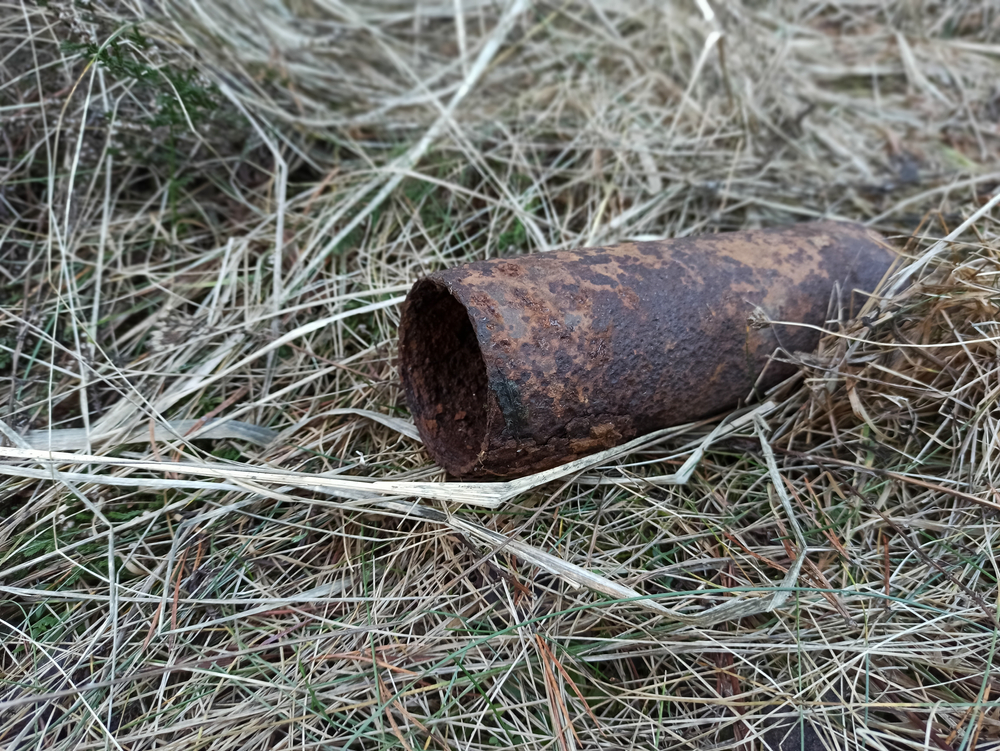90-Year-Old Woman Used a Grenade as a Pestle for Over 20 Years
Last updated on
What if the pestle you’ve used to grind spices for decades turned out to be a live grenade?
For one 90-year-old woman in rural China, that unthinkable scenario was a daily reality though she never knew it. Found in a field and mistaken for a simple tool, the object became part of her household routine: cracking walnuts, pounding red peppers, hammering nails. For over 20 years, she wielded it without a second thought. Only during the demolition of her home did someone recognize the truth: this wasn’t just an old piece of metal it was a Type 67 hand grenade with its fuse still intact.
In a world where modern dangers are often hidden behind screens and signals, this real-life tale is a reminder that sometimes, the most extraordinary risks lie quietly in plain sight.
How It Went Unnoticed for Two Decades
The story of Mrs. Qin’s accidental grenade usage isn’t just shocking it’s also a telling example of how ordinary routines can obscure extraordinary risks. Her discovery of the grenade happened in the most unremarkable way: while working her farmland in Huangbao County more than 20 years ago, she noticed what she described as a “metal lump.” The object’s shape resembled that of a pestle or a small hammer, and without giving it much thought, she took it home and incorporated it into her daily life.
In rural communities, resourcefulness is often born out of necessity. Improvisation repurposing found objects for household tasks is a common practice. For Mrs. Qin, the unfamiliar metal tool became just another handy implement. She used it for pounding red pepper, cracking nuts, grinding spices, and even hammering in nails. With time, the wooden handle became polished and smooth from wear, while the grenade’s head bore dents and pits from years of impact visible signs of repeated use, yet not enough to raise suspicion.
For 20 years, a 90-year-old woman in Xiangyang, China, unknowingly used a hand grenade as a hammer. Mistaking it for a tool after finding it on her farm, she used it for household tasks until demolition workers discovered it while dismantling her home. pic.twitter.com/HPn92zRZT4
— Morbid Knowledge (@Morbidful) February 22, 2025
The absence of any dramatic incident likely reinforced her trust in the object. It didn’t rattle, spark, or behave unusually; it simply performed its tasks, quietly and effectively. To someone without military training or context, especially an elderly farmer with limited exposure to weapons, it’s easy to understand how the grenade’s true nature could go unnoticed.
What makes the tale even more remarkable is how close she unknowingly came to disaster. A section of the fuse was reportedly exposed, and yet the device never detonated not during all the times she struck it against hard surfaces or used it with force. Whether by sheer luck or a mechanical quirk of the grenade itself, Mrs. Qin remained unharmed for over two decades.
The Authorities Step In

The turning point in this unlikely saga came not from the object itself, but from a set of watchful eyes. As workers dismantled Mrs. Qin’s aging home in June, one of them noticed something unsettling about her trusty “hammer.” Unlike a typical tool, it bore the distinct profile of a hand grenade specifically, a Type 67, a model used by the Chinese military and recognizable by its metal-capped wooden handle.
Alarmed by the potential danger, the workers immediately notified local authorities. Within hours, officers from the Huangbao Town police station, along with a specialized bomb disposal unit, arrived at the scene. Their swift response likely prevented what could have been a devastating accident. Upon close inspection, the technicians confirmed the object was indeed a live grenade, astonishingly still equipped with a functional fuse. Despite its rusted appearance and years of battering, the explosive potential remained intact.
The police acted quickly to secure the area and confiscate the device. Experts were called in to safely destroy the grenade, removing any residual threat. In a public statement, authorities emphasized how narrowly catastrophe had been avoided and praised the vigilance of the demolition team.
Recognizing the broader implications of the incident, officials took the opportunity to launch a village-wide safety campaign. Residents were gathered for a community education session on identifying and responding to potentially dangerous objects especially relics that might date back to older conflicts or military stockpiles. “If you find any suspicious objects resembling hand grenades,” police warned, “do not touch them. Do not use them. Report them immediately. The consequences of misuse could be disastrous.”
This official response wasn’t just about removing a single explosive. It underscored a critical message: awareness and quick reporting can save lives. In rural or post-conflict areas, where unexploded ordnance might still lie hidden, that message is not just relevant it’s vital.
Humor, Horror, and Hypotheses

When news of Mrs. Qin’s story surfaced, it swept through Chinese social media like wildfire, eliciting a mixture of disbelief, dark humor, and speculative commentary. For many, the tale was so improbable it bordered on surreal: a nonagenarian pounding pepper and cracking walnuts with a live grenade for over 20 years without incident. The reactions ranged from horrified amazement to ironic admiration.
“I would’ve pulled the pin just out of curiosity,” one user admitted, underscoring the narrow margin between life and tragedy. Another quipped, “Even hand grenades have principles they won’t explode on kind-hearted grandmothers.” The gleaming handle, worn smooth from years of use, became an object of both fascination and personification. “The grenade must have been thinking: ‘Please take me away. I’ve had enough!’” read a popular comment.
While the humor was widespread, it was laced with genuine awe and anxiety. Many acknowledged just how fortunate Mrs. Qin had been, labeling her “incredibly blessed” and even calling her survival “a miracle.” That the grenade never exploded despite frequent, forceful use felt statistically improbable, if not downright impossible.
This improbability led to various theories online. Some speculated that the object might have been a training grenade visually identical to a real one but hollow or filled with non-explosive material. However, this theory was largely dismissed after police confirmed the grenade had a fuse intact and took it for professional disposal. As one commentator noted, “The fact that authorities destroyed it means it wasn’t a dummy. This was just an exceptional stroke of luck.”
While the public tried to make sense of it some with humor, others with nervous energy the underlying sentiment was clear: the line between the absurd and the dangerous is sometimes thinner than we think. And when it’s crossed unknowingly, what remains is not just a viral story, but a sobering lesson in just how unpredictable the real world can be.
Lessons in Everyday Risk and Resilience

The story of Mrs. Qin is more than a viral oddity it holds a deeper resonance about how we navigate the everyday, often unaware of hidden risks that lurk in plain sight. Beneath its shock value and viral humor lies a compelling reflection on human resilience, instinct, and the importance of awareness. Here are the key takeaways:
1. Resourcefulness Can Sometimes Mask Risk
In many rural areas, improvisation is a survival skill. When tools break or aren’t readily available, people often make do with whatever is at hand. Mrs. Qin’s storyhttps://www.deccanherald.com/world/calm-like-a-bomb-chinese-woman-survives-using-grenade-as-hammer-for-20-years-3083307 is a powerful, if extreme, example of this ethos. She found a discarded object in a field and, needing a hammer or pestle, put it to practical use.
But this instinctive resourcefulness, while admirable, can sometimes come with hidden dangers. Not all found objects are benign and some, like unexploded ordnance, are remnants of past conflicts that still pose present-day threats.
2. We Normalize What Becomes Routine
One reason the grenade never raised suspicion is precisely because it worked. It never malfunctioned, made noise, or visibly changed. Over the years, its presence blended into the background of domestic life.
This is a human trait: we grow accustomed to whatever feels consistent, even if it’s not safe. It’s the same reason people grow comfortable ignoring a faulty appliance, a hairline crack in the wall, or an old electrical wire. Familiarity can dull caution.

3. Risk Isn’t Always Loud Sometimes, It’s Quiet and Dusty
The idea that danger always looks dramatic is a myth. Mrs. Qin’s grenade didn’t beep, glow, or feel particularly heavy. It was quiet. Worn. Rusty. Ordinary. And therein lies the deeper lesson: real threats aren’t always obvious, and they rarely announce themselves. This applies not just to physical objects, but to habits, relationships, or situations we accept without question.
4. Community Awareness Saves Lives
Had the demolition workers not recognized the grenade, Mrs. Qin might still be using it today or worse, it might have detonated under slightly different conditions. Their awareness, followed by immediate action, likely saved lives.
This highlights the value of shared knowledge and public safety education. In the wake of the incident, police didn’t just remove the grenade they held training for the village, urging others to report suspicious objects. Their response turned a personal close call into a broader community learning moment.
5. Quiet Strength: Resilience in the Face of the Unknown
Finally, Mrs. Qin’s story is also one of quiet strength. She didn’t survive an explosion but she unknowingly lived alongside one for decades. Her resilience wasn’t heroic in the cinematic sense, but it was deeply human: she simply kept going. Unaware of the danger, she lived with determination and routine a kind of unintentional courage that many elderly individuals demonstrate in quiet ways every day.
When Familiarity Hides Danger: A Final Word
Mrs. Qin’s story may seem like an unbelievable outlier, but it touches on something universal: how easily we can mistake danger for harmlessness when it quietly blends into our routines. Her brush with death wasn’t marked by a loud explosion or dramatic rescue it was a slow, silent coexistence with risk, masked by habit and innocence.
Her survival feels miraculous, but it shouldn’t distract from the serious implications. Whether it’s an old tool in a shed, a strange object in a field, or an overlooked relic from a different era, unfamiliar items especially in areas with military history should never be taken for granted. It’s a story that should encourage communities to invest in safety awareness, inspire families to talk about hidden hazards, and remind authorities to provide education that bridges gaps between lived experience and potential danger.
There’s admiration to be had in Mrs. Qin’s resilience, yes but the real takeaway is caution: even the most ordinary lives can brush up against extraordinary risks, and the best protection is awareness.
Some of the links I post on this site are affiliate links. If you go through them to make a purchase, I will earn a small commission (at no additional cost to you). However, note that I’m recommending these products because of their quality and that I have good experience using them, not because of the commission to be made.

































 JOIN OVER
JOIN OVER
Comments